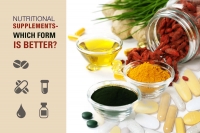Nutritional Supplements - Which Form Is Better?
The supplement market offers a variety of products in the form of tablets, capsules, soft gels, liquids, chewables, and powders. Each has specific applications but there is confusion about the pros and cons of each of them. Consumer education can bring a better understanding of the advances in supplement research and today’s far superior manufacturing technology. Armed with knowledge consumers can make supplement choices based upon what is best for their health needs rather than product format or impressive marketing and packaging.
One major area of confusion is supplement absorption - for example, are tablets, liquids or powders better? High-quality supplements use “inactive” ingredients or “excipients” that assist in tablet disintegration and absorption. The natural coating on a tablet can facilitate better dissolution. While there are several factors determining the absorption, reputable manufacturers test their products for acceptable quality, efficacy and dissolution times by evaluation according to US Pharmacopeia standards.
Faster dissolution is not necessarily always better. Supplements developed with synergistically interacting ingredients are better absorbed as the micronutrients can complement each other in their transit and absorption through the digestive tract. Sometimes slower absorption may be preferable to quicker absorption where higher potencies are concerned as there are limits to how fast and how much of a given nutrient can be absorbed per unit of time. When absorption pathways become overwhelmed with a sudden input of micronutrients, the excess is simply excreted. In general, slower is better when it comes to essential micronutrients. Other factors affecting nutrient absorption include an individual’s ability to digest and absorb any given component - this can affect the elderly or those with chronic digestive illnesses where the absorption is already weak.
Supplement formats
Tablets- In general they are the most cost-effective form as the manufacturer can pack the most material into a given space. They are the most shelf-stable and retain their potency longer. Size can be a drawback and they can be hard to swallow, and they do not offer the dosing flexibility that liquids and powders do.
Capsules- Are widely used in supplement manufacturing. They are easy-to-swallow and break down quickly in the stomach, although this may not always be a nutritional advantage. Capsules can be opened to mix all or part of the powdered contents in soft foods or liquids. This is an advantage for children or others who have difficulty swallowing. A drawback is capsules are expensive and have significant space and potency limitations since the powdered contents can not be compressed like tablets and have a shorter shelf-life than tablets.
Softgels- These one-piece gelatin capsules are almost exclusively used for liquid or oil-based formulas. They are easy to swallow because of their smooth contours. Because they are completely sealed and air-tight, they have a superior shelf life compared to other formats. Soft gel manufacturing is specialized and these products are more expensive than tablets or capsules.
Chewables- Tend to be lower potency when compared to tablets or capsules and they have to have sugar and flavorings added which may be a deterrent for health-conscious consumers. Chewables are best reserved for children or those who cannot swallow tablets or capsules.
Powders- Very cost-effective and offer great dosing flexibility. Powders are more practical for supplements which should be taken in larger quantities.
Liquids- Their flexibility with dosing and are easier for children and the elderly to take. They are marketed based on the belief that they are absorbed faster and are therefore better. However, as previously stated, essential nutrients may be better when absorbed slower. Liquid supplements are expensive, their shelf life is shorter and they often require refrigeration. It is important to read labels before purchasing as many contain added flavors and other harmful ingredients.
Most supplement manufacturers concentrate on marketing rather than the research and efficacy of the ingredient combinations. It is the quality, quantity and combination of the micronutrients in supplements that makes the difference. It is best to choose a supplement based on its efficacy such as immune support, protection of cellular structures, increased antioxidant potential, and collagen synthesis support.
